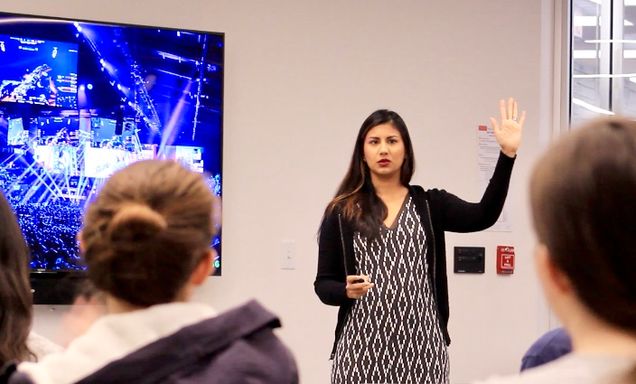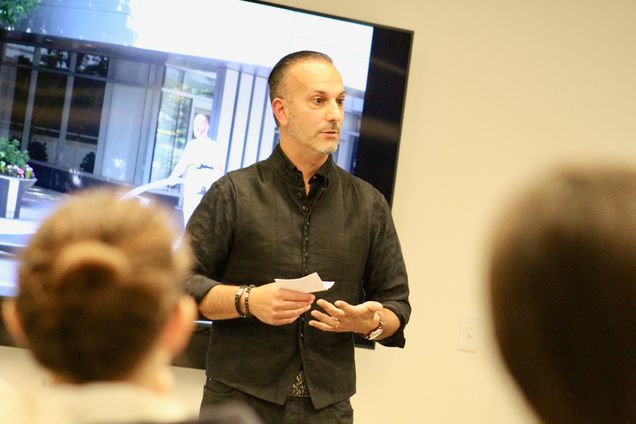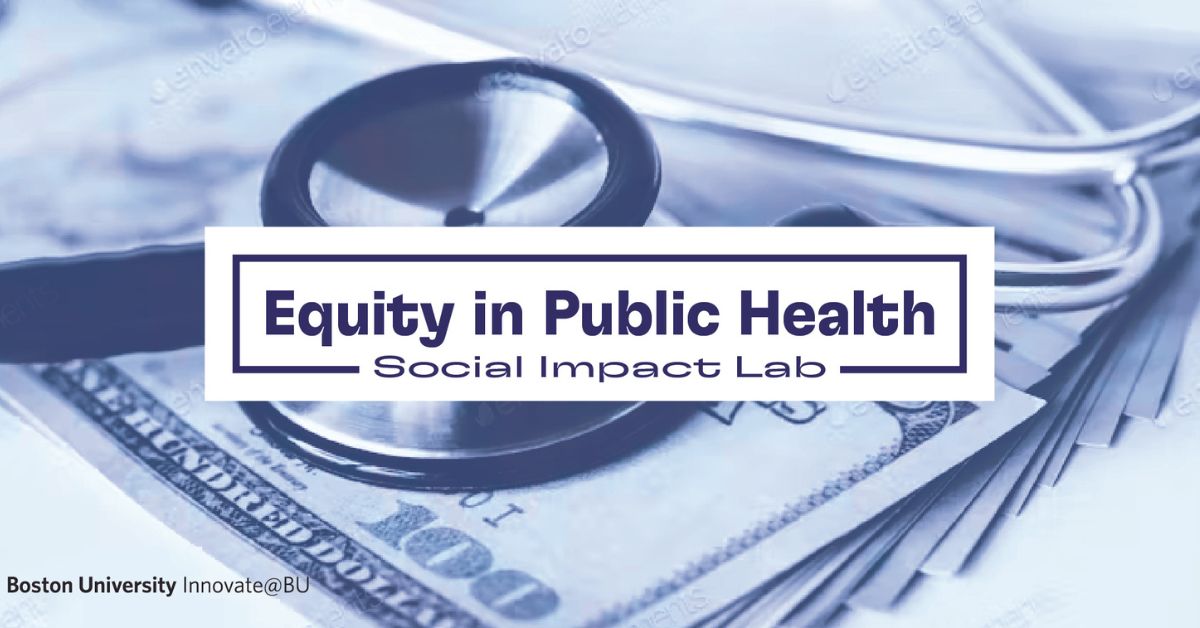BU Artists, Founders, and Researchers Share Meaningful Ways to Impact Addiction
“Anyone can be involved in public health,” said Rafik Wahbi (SPH’20) during the Addiction, Community, & Impact panel held at the BUild Lab on October 8. “Tech experts, artists, writers. Health is impacted by so many things. If you want to be involved with public health, be creative about it. Apply your own skills and passions.”
The panel was part of BU’s inaugural Week of Wellbeing: Terriers Thrive Together, a series of events promoting mental health and well-being, organized by the newly launched Wellbeing Project.
Three panelists from the BU and Boston community shared short lightning talks about the work they are doing to impact addiction.

Kruti Kanojia (Questrom’20), cofounder and CEO of HealthyGamer, is building a peer-to-peer platform to support those suffering from gaming addiction and their families. BU artist-in-residence Domenic Esposito spoke about his protest sculpture piece FDA Spoon that he drops in front of corporations affiliated with the opioid crisis. The spoon will be on display at BU beginning October 10. Public Health student and researcher Rafik Wahbi (SPH’20) shared the impact made by his hip-hop writing class at a local House of Corrections, specifically for incarcerated individuals within the Substance Use Treatment Unit.
Despite working with different mediums and communities, all three panelists agreed on the importance of including those most affected by addiction in the conversation and creation of recovery and development programs.
“Gamers are nowhere to be found in the conversation of what they want and need. When they have input and control over their recovery programs, they go on to lead full lives. [HealthyGamer] treats these individuals as users, not patients.” said Kanojia.
Wahbi agreed that “it should be common sense. If you’re delivering therapy to a group of people, you should ask them how they think it should be done. As a qualitative researcher, I want to ask them how should we be doing this?”
According to the American Society of Addiction Medicine, addiction is characterized by:
- Inability to consistently Abstain
- Impairment in Behavioral control
- Craving; or increased “hunger” for rewarding experience
- Diminished recognition of significant problems with one’s behaviors and interpersonal relationships
- A dysfunctional Emotional response
Panel moderator and Innovate@BU Program Director of Social Innovation Blake Sims St. Louis put these characterizations into context at BU, sharing that:
- 1% of BU students have a history of addiction/substance use disorder (alcohol or drugs) – BU Healthy Minds Study, 2018
- 22 BU students are members of the BU Collegiate Recovery Program (a community of undergrad and graduate students in recovery from substance use) – BU Collegiate Recovery Program
- 8.3% of BU students report internet use/computer game negatively impacted academic performance – BU National College Health Assessment, 2019
So what can BU students do to create meaningful impact in this space?

“It takes patience,” said Esposito, referencing his strategy of connecting changemakers from state to state. “Connect people that have the power to make a difference with those that have already done it.”
If you have experience with gaming or gaming addiction, Kanojia suggested applying to become a HealthyGamer recovery coach noting that “time and sympathy is so important for these individuals.”
And if you’re ready to start exploring your own project or resource, Wahbi stressed the importance of finding a mentor. “They will advocate for you and the work you want to do. For seven months, I was searching on my own for a place that would host my [hip-hop] writing class,” said Wahbi, “After I told my PI about it, he immediately connected with someone he knew. Within 10 minutes I had a place for my program.”
Students interested in working on their own impact projects or ventures are encouraged to use Innovate@BU’s Innovation Pathway, a self-paced guided process to transform ideas into something real. Resources include mentorship, funding, and a supportive community ■
The Week of Wellbeing will continue through Sunday, October 13. Find a full list of events here.
Artist-in-Residence Domenic Esposito will bring his sculpture FDA Spoon to the Boston University Charles River Campus as part of the artist’s ongoing activism to inform and educate the public about the unfolding tragedy of the opioid epidemic and the deadly and destructive effects it has had on people from all walks of life. Find out more about his residency.
Those interested in seeking confidential mental health counseling can contact Student Health Services Behavioral Medicine, the Center for Psychiatric Rehabilitation, the Center for Anxiety & Related Disorders, the Samaritans of Boston suicide hotline, and BU’s Faculty & Staff Assistance office.

